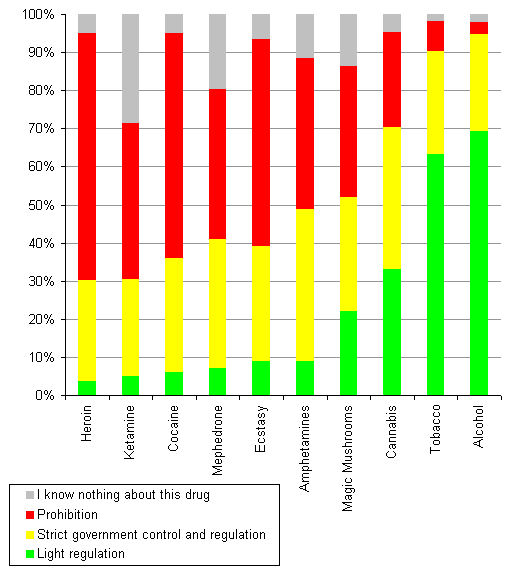Transform reports about an interesting poll that was conducted recently of British adults regarding drug policy. Instead of the usual legalize or not question, they asked people to give options for each drug:
- Light regulation (drugs sold like tobacco and alcohol are now)
- Strict government control and regulation (an example of how government could heavily regulate a legal market in an attempt to minimise harm)
- Prohibition (the current status of illegal drugs)
The results are interesting and could lead to a larger discussion.

I’d like to see a poll done here using similar terms. I think that too often a lot of people out there see prohibition as regulation, when it’s not. By offering regulation as a distinct alternative to prohibition, it requires a different level of thinking.


Wow not many knew about Special K but almost all knew of tobacco, canabis, alcohol. I haven’t heard of mephedrone myself. I’ll look it up in some non tracking you search engine. Do gooders and bible thumpers will probably make sure pot is never legalized. The ol’ slippery slope argument will be used.
Polls are nice. It’s a great tool for getting in the media, because everyone loves a neat graph, and what polls like these do eminently is also CHANGE the perception of those seeing the poll.
Back in March 2009 we collaborated with the HCLU on an EU Drug Policy Initiative poll where we structured the question for cannabis much the same way:
“Total war on cannabis”: 23%
“Decriminalization”: 25%
“Regulate and tax”: 34%%
“Full legalization”: 3%
“Don’t know”: 15%
It made some nice headlines when the three middle ones were added up.
The people who voted to continue the prohibition of cannabis probably also voted for the prohibition of alcohol. No need to be a hypocrite. Ugh…
What…no LSD?
The only thing that bothers me about drug specific polls is the lack of information people have about specific drugs. For example, heroin is relatively safe (#1) it is chemically the same as morphine which millions take safely each year for pain, (#2) according to the governments own data and contrary to popular belief heroin will not turn most users into addicts, in fact only a tiny percentage, I’ve seem estimates ranging around 2%-5%, will ever become addicted; most will try the drug once or become occasional/recreational users and then quit on their own. In fact heroin’s horrid reputation, mainly that just one dose will instantly turn users down the path to thieving, diseased, dirty, jobless, junkie-ism is largely due to the harms imposed upon users by prohibition. For example: Disease spread and harms caused by unsafe injection practices is due to the fact that prohibition has caused governments to forgo rational public health approaches such as needle exchange, prescription heroin, and safe injection sites in favor of harsh criminalization. The thieving junkie meme is obviously the result of prohibition level prices leaving many addicts with no choice but to turn to petty crimes or dealing in order to support their habit. The scarlet letter placed on many users who are caught by law enforcement often ensures that any barriers into the job market are further increased by prohibition policies. Many other examples exist, for this drug and many others. But my point is, that although polls like this can be helpful, I generally have to take them with a grain of salt due to participants’ lack of drug specific knowledge coupled with decades of drug war propaganda and brain washing. I don’t know what the answer is (aside from education)…but it’s generally something I end up having to explain and argue for when I get into it with people that I hear arguing for legalization of *some* drugs-but not the so called “hard” drugs; a partial approach to the prohibition problem, and something that very often frustrates me given that all the social crisis’ cause by prohibition will not be solved with a half assed-approach (for lack of a better term)
Good points Nic.
If one really just applies a “medicine model” for opioids the life of such a patient goes a bit like this:
“John accidentally discovered morphine during knee-surgery. Not only did it take the pain away in the knee, but for the first time it made him feel, well, just normal. He was overcome with the pleasure of being pain free in both the physical and mental way. He didn’t really get deleriously happy, just the kind of happy that follows a time of illness or pain. John was initially surprised, but looking back it was indeed clear that he’d not ever been quite as content as the people around him despite his own assurances that he was ‘doing just fine’.
John’s prescription ran out a week later, so he went to his doctor and described his experience. The doctor listened intently and said to him that in all likelihood he had discovered an underlying depression and that the best anti-depressant was likely an opiod. The doctor then described several strategies for managing this condition and then handed John a prescription for additional morphine. They shook hands and John promised to get back in about a month to take stock of the situation.
Then John went to the pharmacy and got his pills. End of story :)”